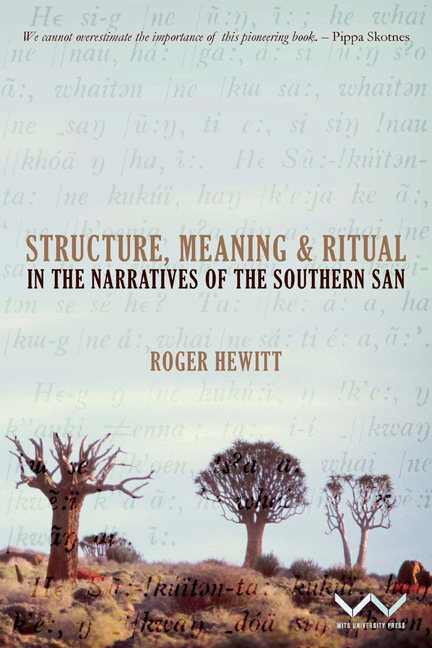Book contents
- Frontmatter
- Dedication
- Contents
- Acknowledgements
- Introduction
- 1 Ethnographic background
- 2 Introduction to the narratives: their context, performance and scope
- 3 Legends and the stories of !Khwa
- 4 Sidereal narratives: the story of the Dawn's Heart and his wife the Lynx
- 5 Animal narratives
- 6 |Kaggen in belief and ritual
- 7 The |Kaggen narratives (1): characters and content
- 8 The |Kaggen narratives (2): sequence and structure
- 9 |Kaggen in belief, ritual and narrative: a synthesis
- 10 Two |Kaggen narratives: compositional variations
- 11 The verbal surface: a note on the narrators
- Appendix A Girls’ puberty observances of the ǀXam
- Appendix B The shamans of the ǀXam
- Bibliography
- Index
3 - Legends and the stories of !Khwa
Published online by Cambridge University Press: 21 April 2018
- Frontmatter
- Dedication
- Contents
- Acknowledgements
- Introduction
- 1 Ethnographic background
- 2 Introduction to the narratives: their context, performance and scope
- 3 Legends and the stories of !Khwa
- 4 Sidereal narratives: the story of the Dawn's Heart and his wife the Lynx
- 5 Animal narratives
- 6 |Kaggen in belief and ritual
- 7 The |Kaggen narratives (1): characters and content
- 8 The |Kaggen narratives (2): sequence and structure
- 9 |Kaggen in belief, ritual and narrative: a synthesis
- 10 Two |Kaggen narratives: compositional variations
- 11 The verbal surface: a note on the narrators
- Appendix A Girls’ puberty observances of the ǀXam
- Appendix B The shamans of the ǀXam
- Bibliography
- Index
Summary
Contained in the Bleek and Lloyd collection are many narratives which are clearly fictional, and a few which are clearly factual. Between these categories there are a number of narratives which appear to be grounded in fact but which contain fictional elements which are elaborated to varying degrees in different narratives. It is evident from such narratives that factual accounts of real events were subjected to a fictionalising process taking place over a long period of time which could ultimately convert the account into pure fiction.
These remarks particularly apply to a small group of narratives which shall be here termed legends. These narratives frequently relate events which could, and probably did, have some foundation in historical fact. They recount the activities of human beings, and these humans, like the animals prior to their transformation into animal form, were said to be !Xwe ǁna s'o !kʔe. In spite of the characters in these narratives being thus called the temporal setting of the stories cannot be regarded as mythological time for they are clearly set in a recent past which was not significantly different from the world of the ǀXam in the 19th century. Furthermore, magic and other non-naturalistic elements are, if not totally absent, usually inessential features of the plot. Thus, as a group, they conform precisely to William Bascom's classification of legends (Bascom 1965: 4f) while some evince those characteristics which Bascom further attributes to narrative material which has moved in the course of time from a factual base towards the fictive. He writes (ibid.):
Reminiscences or anecdotes concern human characters who are known to the narrator or his audience, but apparently they may be retold frequently enough to acquire the style of verbal art and some may be retold after the characters are no longer known at firsthand. They are accepted as truth and can be considered as a sub-type of the legend, or a proto-legend.
It would seem that at some stage during this process the characters described came to be regarded as !Xwe ǁna s'o !kʔe and this designation may itself have legitimated further fictional elaborations.
These legends number only about a dozen although a few of them are amongst the longest and most carefully told in the collection.
- Type
- Chapter
- Information
- Publisher: Wits University PressPrint publication year: 2008



